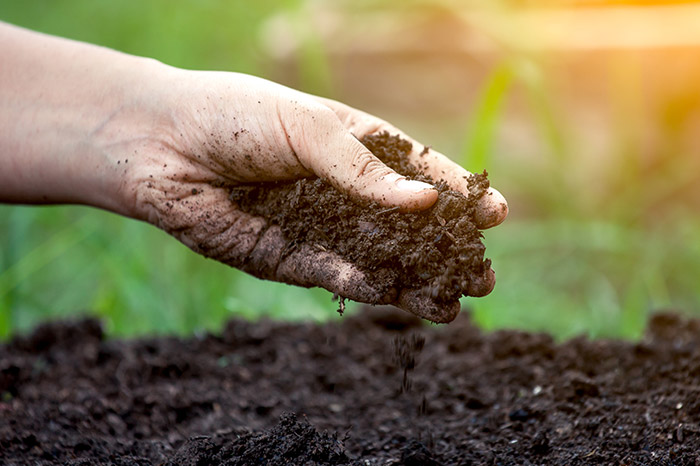
How to “Clean Up” Your Dirt: Soil Prep Tips for the Spring
It’s spring, which means it’s time to get your garden ready for the growing season! You cleaned up debris, leaves, and broken branches, and now it’s time to think about preparing your soil for planting. Out in nature, in undisturbed forests and fields, organic debris and leaf litter remain on the soil surface to decay naturally. Decaying organic matter helps keep plants and trees healthy. In the garden landscape, we remove this debris routinely to keep things looking tidy. Because of this, we expend great effort replacing the potentially beneficial aspects of decaying organic matter we removed in fall clean-up.
In preparing our soil for the spring, we can address issues regarding soil compaction, soil fertility, water drainage and retention, and mulching. Here are a few tips for “cleaning up” your dirt.
Soil Compaction
When we talk about soil compaction, we think about the porosity, or pore size, of soil composition. Soil pores are the empty spaces between soil particles. These allow for proper water movement, ease of plant root growth, and room for necessary nutrients and air. In compacted soil, pore sizes decrease, making it more difficult to grow healthy plants. Spring is a good time to improve compacted soil by breaking up clumps and working in soil amendments like compost, leaf mold, and sand (if your soil is burden with clay).
Benefits of Soil Testing
Getting your soil tested will help you know the composition of your soil. Local and state cooperative extension services often offer soil testing services. A soil test will tell you information like the composition and nutrient content of your soil and soil pH. This information will help you know what amendments your soil needs. Check here to find your cooperative extension services in your state.
Good Soil Amendments and Fertilizers
Many gardeners look for organic products – fertilizers and soil amendments – to help their plants and trees grow. This is especially important when fertilizing plants you and your family will consume. Arborjet has a great product to help improve your garden soil. ArborChar worked into the soil or top-dressed, helps improve soil fertility and water retention and reduces nutrient leaching. Learn more about which ArborChar product is best for your garden on Arborjet’s website.
Mulching
Mulching around garden plants, trees, and shrubs is a good idea for several reasons. A layer of mulch will help retain moisture and reduce your need to add water. Mulch also helps keep weeds at bay and reduces this back-breaking chore! Mulch eventually breaks down. Decaying mulch will add nutrients to the soil.
Plan Ahead
During the gardening season, your garden and lawn will produce great material to add to a compost pile or bin. Collected debris from pruning, weeding, discarded potting soil, leaves, and lawn clippings (if you do not use chemical lawn products) all are ideal to add to your compost bin. You will soon have beautiful, rich compost to add to your garden. If you do not have an area for composting, many municipalities will pick up your yard waste. Many towns and cities will allow you to pick up already composted material to use in your garden.
It’s fun and interesting to learn about your garden soil and how to improve it to get better results with your plants! Learning about soil fertility and garden needs will help you have a healthy, vibrant garden environment all spring long.
To see our full list of recommended sustainable garden products, visit our shop.


Sorry, the comment form is closed at this time.